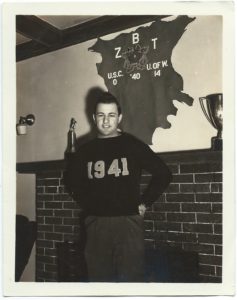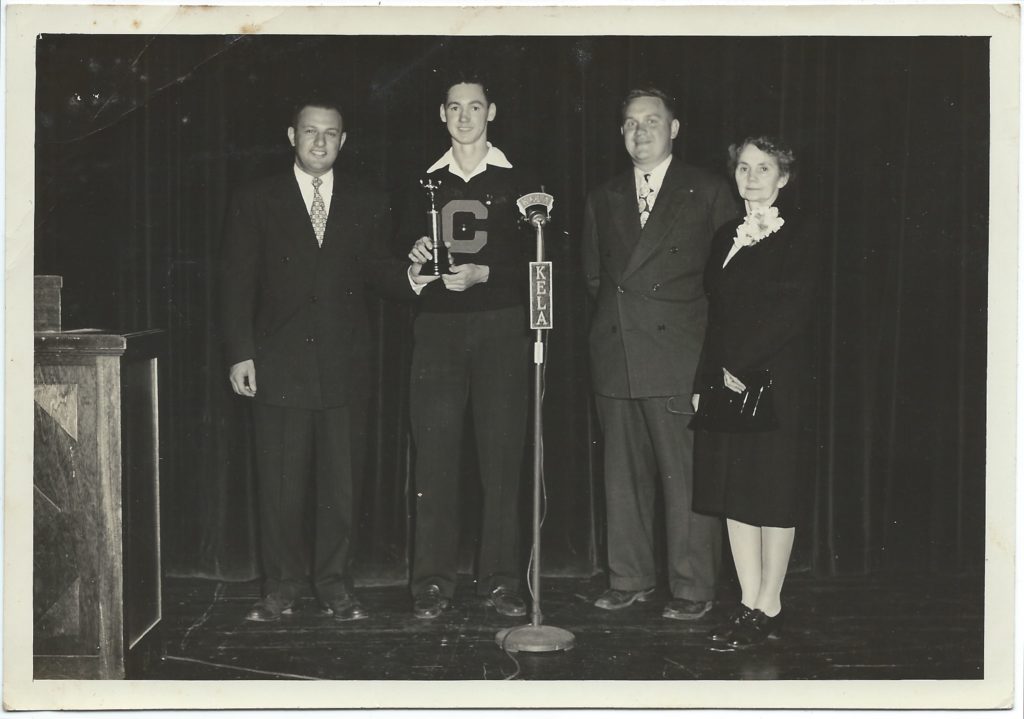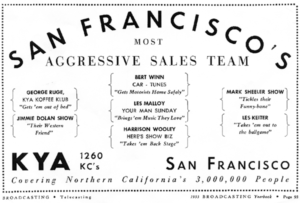
J. Elroy McCaw and KYA Radio
In April of 1950, J. Elroy McCaw and his partner each purchased a 50 percent interest in KYA Radio, San Francisco from Dorothy Schiff, who, incidentally, owned the New York Post for almost 40 years. Dorothy was selling the station at a steep loss from her purchase price due to the fact that the station wasn’t quite profitable, so McCaw had every reason in the world to make some changes. And, as was now his pattern, McCaw hired Les Keiter to be KYA’s sports director.
Post-war Boom
As Les and Lila Keiter (let’s not forget – she was 8 months pregnant) were winging their way back from Honolulu to the mainland for Les’ new job in San Francisco, the west coast was in a post-war boom, and the Bay Area was quickly becoming a major metropolis. Former soldiers from farming families were heading into cities for college and better jobs, and GI’s who had passed through and fallen in love with San Francisco on their way to fight in the Pacific were back to start families of their own. To help accommodate everybody, the last sand dunes in what would become The Sunset District were being leveled for the construction of cookie cutter houses, purchased with loans backed by GI Bill guarantees.
Upon their arrival, Les and Lila set up another house-hold, and Les went to work, broadcasting daily from the Fairmont Hotel in downtown San Francisco, starting mid-season with college football: Stanford, California, San Jose State, Santa Clara, St. Mary’s, and College of the Pacific.
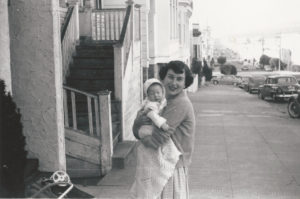
The Keiter’s were still settling in when, on November 10, 1950, Lila gave birth to the their first son, Richard Allan. The family has always called him Ricky, and as Les said, Lila proved to be as adept a mother as she had been a scorekeeper.
Meanwhile, in Texas…
During the war, a Texan sportscaster named Gordon McLendon (self nicknamed “the Old Scottsman,” even though he was in his early 30’s) had the idea to create a radio network dedicated to bringing baseball recreations to rural areas when, as Time Magazine wrote, “he found that boys from Arkansas argued just as hotly as Brooklynites about big-league baseball, even though the only games they ever heard were the World Series.” The radio network McLendon started in 1948, just two years before the Time Magazine article, was called the Liberty Broadcasting System. McLendon was onto something – people loved listening to baseball! The network’s recreations were jazzed up just enough to keep them believable, while sometimes making them even more interesting to hear than a game called live from the stadium. As stations signed on, minor league ball game attendance rose across the country.
The Liberty Broadcasting System had meteoric growth. There were 240 stations in the network by 1950.
Back to San Francisco
To supplement KYA Radio’s current offerings of college football, basketball, boxing, and other sports with as much action as possible, Les Keiter and station manager Jock Fearnhead signed KYA on to the Liberty network for the 1951 baseball season.
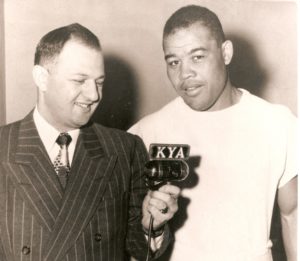
By 1952, when Liberty was up to 458 stations nationwide, Major League Baseball realized how much money they’d been leaving on the table and raised their annual rights fee from $1,000 to $225,000. The astronomically increased bill combined with the fact that both professional baseball and football began restricting broadcasts around cities with league teams, and the Liberty Broadcasting System went out of business almost overnight.
Baseball is a HIT
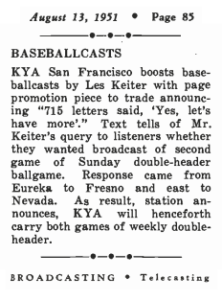
Here’s a notice from Broadcasting Magazine in which it was reported that Keiter had polled his audience to see if they wanted to hear double headers on Sunday’s. Whether KYA Radio saw the imminent demise of Liberty, or they simply wanted to satisfy the demands of their audience with even more baseball, after one season with the network, Les Keiter and KYA Radio began doing baseball recreates on their own.
McCaw’s methods for getting live game statistics for the recreations could be, to put it politely, imaginative. To be blunt, according to Les, they eventually lead to charges of game piracy. Les said McCaw once hired a spotter to phone in the details of Dodgers’ games from a tree overlooking Brooklyn’s Ebbets Field. Keiter filled in the gaps with his own quick imagination. As in Honolulu, recreates of baseball games made Les’s reputation in the Bay Area.
By 1952, Lila was pregnant again, and on November 22nd, gave birth to a surprise set of twins, a girl and a boy: Martin Bruce and Barbara Ruth.
Boom!
Just a month or two later, and only three years after coming to San Francisco, guess what happened? J. Elroy McCaw turned Les Keiter’s life upside down, yet again:
“Be in New York a week from Monday. You are the new sports director at WINS Radio in Manhattan.”

